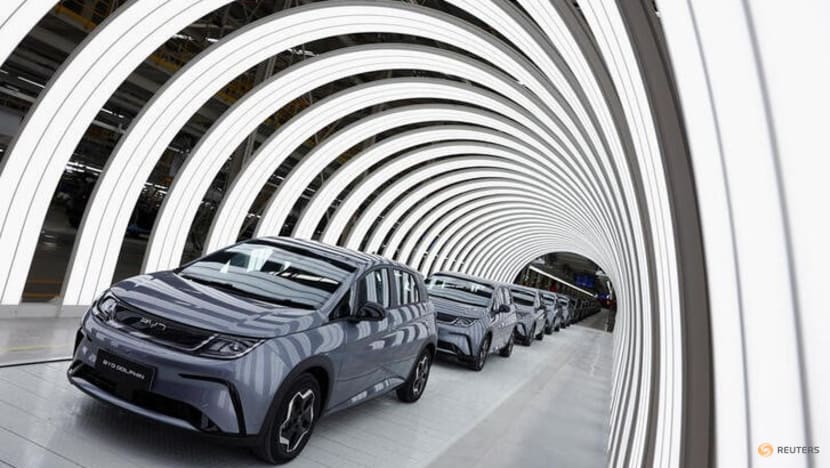China EV makers to pivot to emerging markets as US, EU hike tariffs
The shift also comes amid Chinese President Xi Jinping and his government’s increasing desire to boost cooperation with the Global South, which China considers itself a part of.

Electric cars are pictured inside BYD's first electric vehicle (EV) factory in Southeast Asia, a fast-growing regional EV market where it has become the dominant player, in Rayong, Thailand, July 4, 2024. (Photo: REUTERS/Chalinee Thirasupa)

This audio is generated by an AI tool.
BEIJING: Amid accusations from the West that heavy subsidies have made China’s electric vehicles (EVs) unfairly cheap, some Chinese carmakers have begun pivoting to friendlier emerging markets.
The United States and the European Union have slapped higher tariffs on Chinese EV imports in a bid to counter the competitiveness they believe such subsidies afford. The EU also hopes the move will tackle Chinese industrial overcapacity flooding the bloc.
The EU’s higher duties came into effect on Friday (Jul 5), pending a final decision in four months' time as intensive talks continue. The German auto sector has asked for the tariffs to be dropped, fearing the wide-ranging retaliation that Beijing has threatened
The US will increase tariffs on Chinese EVs to 100 per cent later this year, up from 25 per cent currently.
Canada is considering taking their lead.
FOCUS ON GLOBAL SOUTH
While the European and the US markets are important, they are not the only ones, noted Dr John Quelch, executive vice-chancellor at Duke Kunshan University in China.
He added that there are “plenty of opportunities” for the Chinese EV export market and manufacturing to develop overseas.
On top of selling their products to emerging markets, Chinese EV makers have begun to set up production in local industrial parks to avoid unnecessary barriers, noted Dr Li Fang, country director at the World Resources Institute China.
For instance, BYD opened its first EV factory in Thailand on Thursday, its first in Southeast Asia.
Dr Fang said that establishing manufacturing bases in developing countries also serves to help with their EV transformations.
“It can be seen as a part of our South-South cooperation and as a part of the response to new global trade rules,” she added, referring to cooperation among countries of the Global South.
The Global South, which broadly includes countries in Africa, Asia and Latin America, refers to various nations that are sometimes described as “developing”, “less developed” or “underdeveloped”.
The shift also comes amid Chinese President Xi Jinping and his government’s increasing desire to boost cooperation with the grouping, which China considers itself a part of.
Dr Quelch also pointed out that China could collaborate with countries that have auto manufacturing industries such as Mexico.
CHINA’S EV TRADE
Last year, China exported over 4 million cars, making it the largest auto exporter in the world. Among them, over a quarter – about 1.2 million cars – were EVs.
The uptake at home is also high, with China accounting for just under 60 per cent of EVs registered globally.
Some analysts said trade barriers aim to give US and European legacy car manufacturers more time to catch up with their Chinese counterparts.
Domestic politics are also involved, especially with the looming presidential election in the US in November, they said.
The American legacy companies are very important from a political point of view, said Dr Quelch.
“The workers who are in those auto plants are in swing states and the Midwest, and they're going to be very important in the upcoming presidential election,” he noted.
“So don't expect to see any movement in terms of relaxation of the anti-China modus operandi until certainly 2025."
SETBACK IN DECARBONISATION
However, as China looks for less hostile markets, the cost of such decoupling could be a setback in an urgent global push to decarbonise transport and use more sustainable energy.
According to the International Energy Agency, road transport accounts for around a sixth of global emissions.
The United Nations has set a goal of substantially increasing the share of renewable energy in the global mix by 2030.
"We actually should encourage more investment ... and much less protectionism in these areas," said Dr Keyu Jin, associate professor of economics at the London School of Economics and Political Science.
China can do more to invest in Europe directly - it will benefit not just both parties, but the world, she said.
“(It will) help us to jumpstart new strategic industries that are so critical for the structural transformation underway," she added.
Other experts have echoed her view, saying that higher costs to adopt such energy without China’s cheaper alternatives will increase the cost of transition for countries.
“If we want to achieve the goal of transformation with the same amount of funds, we may have to extend the time,” said Dr Fang.
BRISK SALES CONTINUE FOR EV MAKERS
In June, the month before the EU’s tariffs, premium EV firm NIO saw record sales along with other brands BYD and Zeekr.
Breaking into overseas markets, especially a lucrative one such as Europe, is part of a long game firms like his cannot afford to miss, NIO’s co-founder and president Qin Lihong told CNA.
“The most fundamental problem of this industry is not production capacity. The world pays a lot of attention to China's new energy vehicles, and there are many opinions,” said Mr Qin.
“In fact, I think the essence of this is that China has truly surpassed in products and technology in the field of new energy vehicles for the first time.”
He added that changing political and policy environments are part of the challenges EV firms face. Manufacturers must ensure that they remain competitive, he said.
NIO currently operates in the Netherlands, mainland China, Hong Kong, Germany, Norway and the US.
When asked if there are plans to collaborate with foreign carmakers, Mr Qin said: “In the process of development, we will not exclude any form of cooperation with others as long as our common interests are consistent."




















